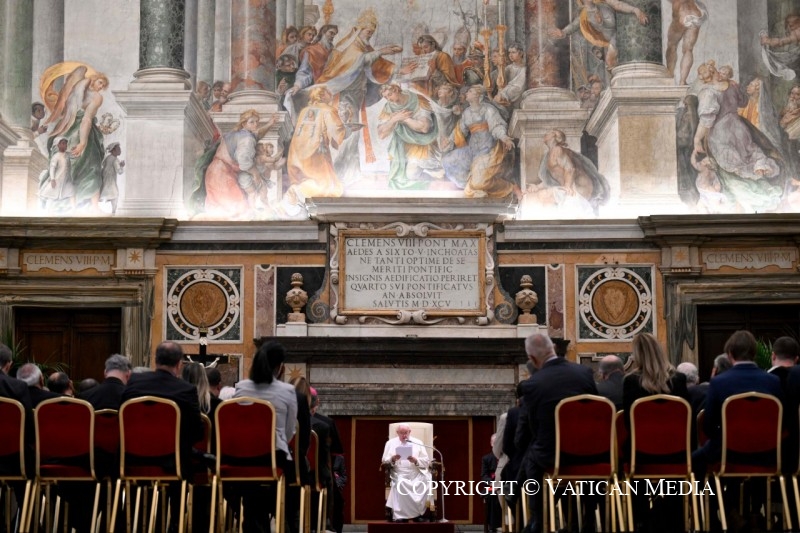Pope says the history of the Church must not leave out its errors
Francis released a letter dedicated to the study of this subject in connection with the training of priests and pastoral workers. He warns against interested denialism that nowadays is used to “justify wars, persecutions”.
Vatican City (AsiaNews) – Pope Francis writes in a letter that the Church must not be afraid even to look at the “spots and wrinkles” of her history, like Gospels, which, in describing the genealogy of Jesus, mention a "number of figures who are problematic to say the least”, emphasising “the sin of King David” in a story where “everything culminates with Mary and Christ.”
The document, Letter of the Holy Father Francis on the Renewal of the Study of Church history, was made public today at the Vatican. It addresses this topic in relation to the training of priests and pastoral workers.
During the presentation, Card Lazzaro You Heung-sik, Prefect of the Dicastery for the Clergy, notes that the letter continues a discussion that began last August with Letter of His Holiness Pope Francis on the Role of Literature in Formation on “priestly, Christian and human formation that goes towards a full awareness of being priests, Christians, human beings who seek to understand and understand each other in carrying out God's plan.”
In his letter, Francis writes, “I am well aware that, in the formation of candidates for the priesthood, a good deal of attention is devoted to the study of Church history, as is only right and proper.”
For him, the real challenge today is to promote not “only a solid and detailed knowledge of major events in the past twenty centuries of Christianity, but also and above all, the cultivation of a clear sense of the historical dimension that is ours as human beings.”
“A proper sense of history can help each of us to develop a better sense of proportion and perspective in coming to understand reality as it is and not as we imagine it or would prefer reality to be. Setting aside dangerous and disembodied abstractions, we are able to relate to reality as it summons us to ethical responsibility, sharing and solidarity.”
For this reason, “Church history helps us to see the real Church and to love the Church as she truly exists, and love what she has learnt and continues to learn from her mistakes and failures.” Indeed, “This can serve as a corrective to the misguided approach that would view reality only from a triumphalist defence of our function or role.”
In the letter, the pope warns human society against interested denialism. “Faced with the cancellation of past history or with clearly biased historical narratives, the work of historians, together with knowledge and dissemination of their work, can act as a curb on misrepresentations, partisan efforts at revisionism, and their use to justify wars, persecutions, the production, sale, and utilization of weapons and any number of other evils.”
He warns against the flood of “‘memories’, often false, artificial and even mendacious, and at the same time an absence of history and historical awareness in civil society and even in our Christian communities.”
In this context, “A sincere and courageous study of history, then, helps the Church to understand better her relations with different peoples, and these efforts must assist in interpreting and making clear the most difficult and perplexing moments of these peoples.”
Taking up the words spoken in Hiroshima, Francis reiterates that “The Shoah should not be forgotten... Nor must we forget the atomic bombs dropped on Hiroshima and Nagasaki... Neither must we forget the persecutions, the slave trade and the ethnic killings that continue in various countries, as well as the many other historical events that make us ashamed of our humanity.”
“Together with memory, the search for historical truth is necessary to allow the Church to initiate – and help initiate in society – sincere and effective paths of reconciliation and social peace”.
The Letter ends with some practical advice relating to the study of Church history, calling for special care for the events of “those whose voices were not able to make themselves heard over the centuries.”
The pope asks: “[I]s it not a privilege for the Church historian to bring to light as much as possible the popular faces of the ‘least important’ and to reconstruct the history of their defeats and the oppressions they suffered, together with their human and spiritual riches, offering tools for understanding today’s phenomena of marginalization and exclusion?”
in concluding, Francis notes the central place of events involving martyrs. In fact, “there is no history of the Church without martyrdom,” he says. “Even in the history of her sufferings, ‘the Church herself also recognizes that she has benefited and is still benefiting from the opposition of her enemies and persecutors’. Precisely where the Church has not triumphed in the eyes of the world is when she has attained her greatest beauty.”
25/01/2023 12:19







.png)










